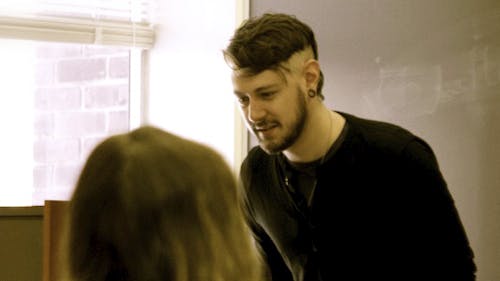Rutgers ‘Politicizing Beyoncé’ course moves to Department of American Studies

Only six years into its existence, the Department of Women’s and Gender Studies decided they were not “crazy in love” with the idea of offering students the “Politicizing Beyoncé” course in the near future.
After not being included on the department’s course schedule for two semesters, the highly popular black feminism class that addresses topics like power dynamics and sexuality will be offered in Fall 2016 by the Department of American Studies.
“Politicizing Beyoncé” was created in 2010 as a special topics class for the Department of Women’s and Gender Studies, said Kevin Allred, a professor in the Department of American Studies and the course's creator.
“They’ve given me no reason for why it’s wasn’t renewed for the spring or summer, so after hearing back that the schedule was finalized and ... that it wasn’t being offered, I went to the American Studies department,” he said.
Allred pitched “Politicizing Beyoncé” to the Department of American Studies because he is an adjunct professor, and he will not get paid for teaching any courses for two semesters in a row if no department offers the course to students, he said.
It is not unusual for courses to be offered in one department and then be offered in another, said University spokesman Greg Trevor on behalf of the Department of Women’s and Gender Studies.
“This course has not disappeared from the spring schedule,” Trevor said in an email. “It is an elective course that was never scheduled to be offered in the spring semester. Not all courses are offered every semester. This course has not been offered every semester.”
Allred said he understands that a course does not have to be offered just because it is popular, but he is confused about why the Department of Women’s and Gender Studies did not want to offer the course at all in 2016, given its generally positive student response.
“They just won’t communicate with me at all about it,” he said. “They’ve put up their statement about how they’re constantly reevaluating courses and changing things up — kind of bureaucratic. To me it didn’t mean all that much.”
During his time traveling to other institutions to give lectures about black feminism, Allred said he has noticed that some people feel offended by his positioning Beyoncé, a figure of pop culture, with well-known activists like Sojourner Truth and Ida B. Wells.
There seems to be retaliation against the idea that learning black feminism through Beyoncé is fitting, because many have their own opinion on whether or not the singer is truly helping the feminist cause or only pretending to do so, he said.
“I can’t say anything for certain because I don’t know, but I do get a sense that there’s a real pushback against … looking at Beyoncé as seriously as looking at (historical) black feminist figures,” he said. “There’s maybe a political discomfort around that.”
The point of the class is to not only talk about Beyoncé, but also about looking at pop culture, analyzing music videos and observing media that Americans and people worldwide consume on a daily basis, Allred said.
Beyoncé is a good figure to analyze in a classroom setting because she reached levels of power that are unusual, especially for a black woman in entertainment, Allred said.
“Everyone — even if you’re not a fan of hers — knows who she is, and a lot of her music,” he said. “She says she’s a feminist figure, I think we should take her word for that.”
Labeling “Politicizing Beyoncé” as a black feminism course reduces it in many ways, said Louis Masur, chair of the Department of American Studies.
Like many of the other “specialized” American Studies courses, “Politicizing Beyoncé” fits in the puzzle because it helps students cultivate a special set of analytical skills needed to understand American culture, he said.
“Students will be thinking hard about what it means to be a pop star, what it means to be a black woman in American culture — the ways in which Beyoncé is indeed a political figure who invites us to answer broader questions,” he said.
The switch opens the course up to new opportunities to delve into unexplored territory, such as themes of rebellion, in addition to familiar themes of gender, sexuality and power, Masur said.
“It definitely allows (Allred) to broaden the scope of the course,” he said. “So while issues of black feminism are critical, it also allows him to probe questions of American culture, celebrity, the music industry (and) the politics of pop culture.”
With the switch to the Department of American Studies this fall, the bulk of the “Politicizing Beyoncé” will remain the same, but students will now be required to consider different concepts while completing writing assignments, Allred said.
“It’ll let us open it up and kind of look more into American music,” he said. “(Black feminism) will still be a core topic of the course, as well as Beyoncé’s representation as a black woman, but we can also talk about how she fits into different places.”
Starting this fall, students pursuing a minor in American studies can essentially complete more than half of the program by taking courses about the history of hip-hop music, Bruce Springsteen, Spike Lee, as well as Beyoncé, Masur said.
“Politicizing Beyoncé” is unique in many ways, but particularly so because it teaches pop culture as it happens, Allred said. Whenever Beyoncé releases a new album or music video, the syllabus will be revised to reflect new developments in her career.
“To keep pop culture out of education seems silly to me,” he said. “Why not use someone who created this huge platform around herself and has so much power … and then use it to teach the same kinds of things we can teach in a number of different ways?”



